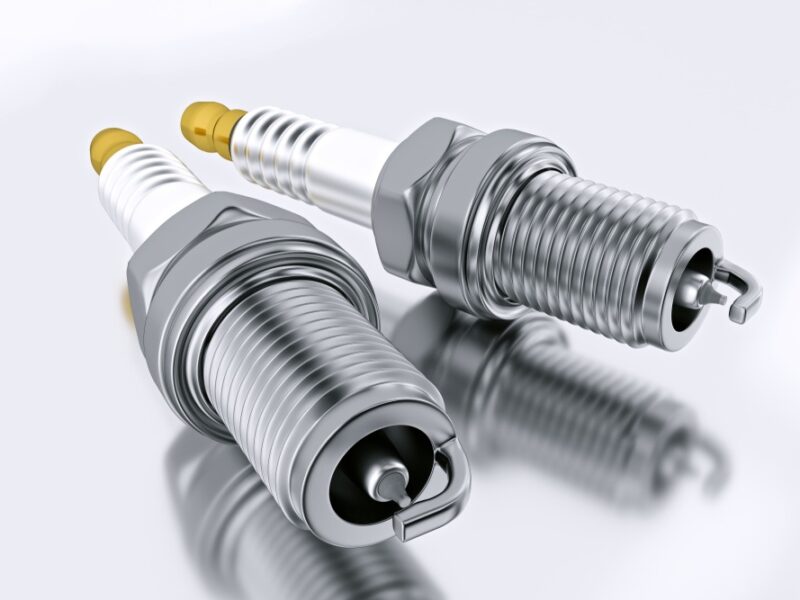How Spark Plugs Powers Your Engine
A spark plug is a crucial component in an internal combustion engine, responsible for igniting the air-fuel mixture within the engine’s cylinders. This ignition process is vital as it creates the explosion that drives the pistons, ultimately powering the vehicle.
The spark plug operates by delivering a high-voltage electrical charge from the ignition system, which jumps the gap between its electrodes to produce a spark. This seemingly simple process is the key to starting the engine and maintaining its smooth operation, making the spark plug indispensable for any gasoline-powered vehicle.
Over time, spark plugs can wear out or become fouled by carbon deposits, oil or fuel additives, leading to poor engine performance, misfires and reduced fuel efficiency. Regular maintenance and timely replacement of spark plugs are essential to ensure that your engine runs efficiently and reliably.
Different types of spark plugs, such as copper, platinum and iridium, offer varying levels of durability and performance, making it important to choose the right type for your specific vehicle. By understanding the role and importance of spark plugs, drivers can better maintain their engines and enjoy optimal vehicle performance.
How Does a Spark Plug Work?
The working mechanism of a spark plug is both fascinating and complex. At its core, the spark plug is responsible for converting electrical energy from the ignition system into a spark that ignites the fuel mixture. Here’s a breakdown of the process:
- Electricity Generation: When you turn the ignition key, the battery sends voltage to the ignition coil, which then increases the voltage to a level high enough to jump the gap between the spark plug’s electrodes.
- Spark Creation: The high voltage travels down the spark plug wire to the tip of the spark plug. This voltage is so strong that it forces electrons to jump across the gap between the center electrode and the ground electrode, creating a spark.
- Ignition: This spark ignites the air-fuel mixture in the engine’s cylinder, causing a mini-explosion that pushes the piston down. This process is repeated thousands of times per minute in a running engine.
- Exhaust: After the explosion, the spent fuel is pushed out of the cylinder and the cycle begins again.
This process happens in rapid succession, often thousands of times per minute, depending on the engine’s speed. The spark plug is subjected to extreme conditions: high temperatures, pressures and constant exposure to gasoline and oil residues. This is why the quality and condition of the spark plug are crucial to the engine’s performance.
The Different Types of Spark Plugs
Not all spark plugs are created equal. There are several different types, each designed for specific engine types and performance requirements. Here’s a look at the most common types of spark plugs:
- Copper Spark Plugs: These are the most basic type, featuring a copper core and a nickel alloy for the outer electrode. Copper spark plugs are typically used in older vehicles and offer good performance for a low cost. However, they tend to wear out faster than other types.
- Platinum Spark Plugs: Featuring a platinum disc welded to the center electrode, these spark plugs last longer than copper ones. Platinum spark plugs are more efficient at conducting electricity and are better at withstanding high temperatures, making them suitable for modern engines.
- Iridium Spark Plugs: These are considered the premium option, with an iridium center electrode that’s even harder than platinum. Iridium spark plugs offer the best performance and longevity, often lasting up to 25% longer than platinum spark plugs. They are also better at igniting lean fuel mixtures, making them ideal for high-performance engines.
- Double Platinum and Double Iridium Spark Plugs: These are variations that use platinum or iridium on both the center and ground electrodes, offering even greater durability and efficiency. They are designed for engines that use a waste spark ignition system.
Why Regular Spark Plug Maintenance Matters
Regular maintenance of your spark plug is essential for several reasons. First and foremost, it ensures that your engine starts easily and runs smoothly. Over time, spark plugs can become fouled with deposits from fuel additives, oil or carbon. This can cause the spark plug to misfire, leading to a rough engine idle, poor acceleration and increased fuel consumption.
Additionally, a worn-out spark plug can put extra strain on the ignition system, leading to premature wear of other components such as ignition coils and wires. By replacing your spark plug at the recommended intervals, you can avoid these issues and keep your engine running at peak performance.
Signs That Your Spark Plug Needs Replacing
Knowing when to replace your spark plug can save you from potential engine problems down the road. Here are some common signs that it’s time to check or replace your spark plugs:
- Engine Misfires: If your engine is misfiring, it could be a sign that the spark plug isn’t generating a strong enough spark to ignite the fuel mixture.
- Poor Fuel Economy: A worn spark plug can cause incomplete combustion, which in turn leads to increased fuel consumption.
- Difficulty Starting the Engine: If your engine takes longer than usual to start, it could be due to a faulty spark plug that isn’t generating enough spark.
- Rough Idle: If your engine idles roughly or vibrates excessively, it could be a sign that the spark plug is failing.
- Lack of Acceleration: A bad spark plug can cause a noticeable decrease in acceleration and overall engine performance.
Choosing the Right Spark Plug for Your Vehicle
Choosing the right spark plug for your vehicle is crucial for maintaining engine performance. The type of spark plug you need will depend on several factors, including the make and model of your vehicle, the type of engine and your driving habits. It’s always a good idea to consult your vehicle’s owner manual or a trusted mechanic to ensure you’re using the correct spark plug.
If you drive a high-performance vehicle, for example, an iridium spark plug might be the best choice due to its superior durability and efficiency. On the other hand, if you drive an older vehicle with a simpler engine, a copper spark plug might suffice.
The Impact of Spark Plug Gapping
One often overlooked aspect of spark plug maintenance is the importance of proper gapping. The gap between the spark plug’s center and ground electrode must be set to the correct distance to ensure optimal performance. If the gap is too small, the spark might not be strong enough to ignite the fuel mixture. If it’s too large, the spark might not occur at all.
Most spark plugs come pre-gapped from the manufacturer, but it’s still important to check the gap before installation. You can use a gap gauge tool to measure and adjust the gap if necessary. Proper gapping ensures that your spark plug will perform as intended, providing the right amount of spark for efficient combustion.
The Relationship Between Spark Plugs and Fuel Efficiency
Fuel efficiency is a major concern for most drivers, especially with rising fuel costs. The condition of your spark plug plays a significant role in determining your vehicle’s fuel efficiency. When a spark plug is in good condition, it ensures that the fuel is burned completely during each combustion cycle, maximizing energy output and minimizing wasted fuel.
Conversely, a worn or fouled spark plug can cause incomplete combustion, leading to wasted fuel and lower fuel efficiency. Regularly checking and replacing your spark plug is a simple yet effective way to improve your vehicle’s fuel economy and reduce your overall fuel costs.
Common Spark Plug Issues and How to Fix Them
Spark plugs are durable components, but they are not immune to issues. Some of the most common spark plug problems include:
- Fouling: This occurs when the spark plug becomes coated with oil, fuel or carbon deposits. Fouling can cause misfires and reduced engine performance. The solution is to clean or replace the spark plug.
- Electrode Wear: Over time, the spark plug’s electrodes can wear down, increasing the gap and reducing the spark’s effectiveness. When this happens, it’s time to replace the spark plug.
- Heat Range Problems: Spark plugs are designed with specific heat ranges to handle the temperature of the engine. If you’re using a spark plug with the wrong heat range, it can cause pre-ignition or detonation, leading to engine damage. Make sure you’re using the correct spark plug for your vehicle.
- Cracked Insulator: The ceramic insulator of a spark plug can crack due to overheating or impact. A cracked insulator can cause the spark to escape before it reaches the electrode, leading to misfires. In this case, the spark plug should be replaced immediately.
As automotive technology advances, so does spark plug technology. Modern engines are becoming more complex and the demands placed on spark plugs are increasing. To meet these demands, manufacturers are developing new materials and designs that offer better performance, durability and efficiency.
One area of development is in the materials used for the electrodes. While iridium is currently the top choice for high-performance spark plugs, researchers are exploring the use of other rare metals that could offer even better performance. Additionally, advancements in spark plug design are leading to improved combustion efficiency and reduced emissions, helping to make engines more environmentally friendly.
The spark plug might be small, but it’s an essential component that plays a critical role in your vehicle’s engine performance. From starting the engine to ensuring optimal fuel efficiency, the spark plug is at the heart of your vehicle’s operation.






